新目标(Go for it)中考复习(七下)Units 1-12(浙江省温州市)
文档属性
| 名称 | 新目标(Go for it)中考复习(七下)Units 1-12(浙江省温州市) |  | |
| 格式 | rar | ||
| 文件大小 | 3.0MB | ||
| 资源类型 | 教案 | ||
| 版本资源 | 通用版 | ||
| 科目 | 英语 | ||
| 更新时间 | 2009-03-13 20:39:00 | ||
图片预览

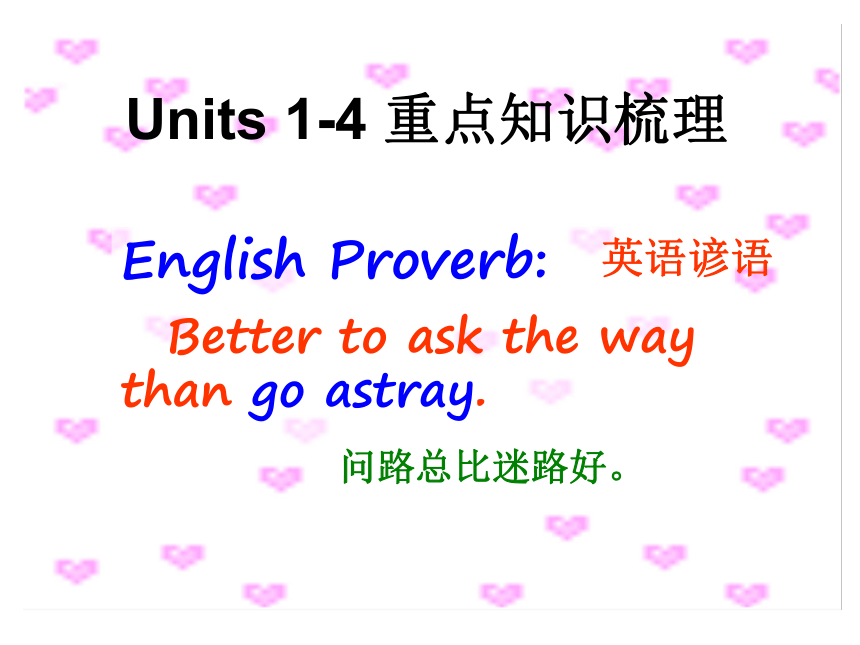
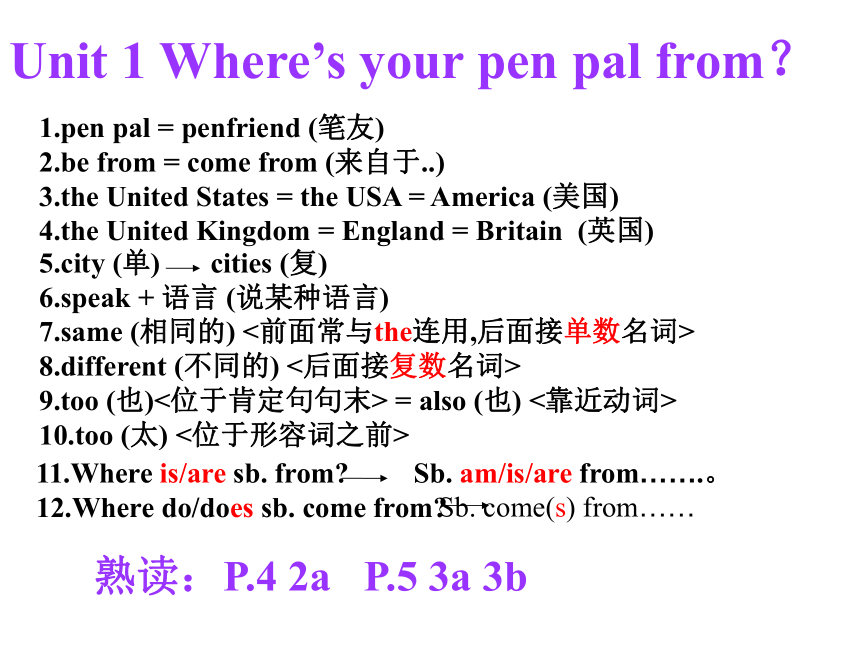
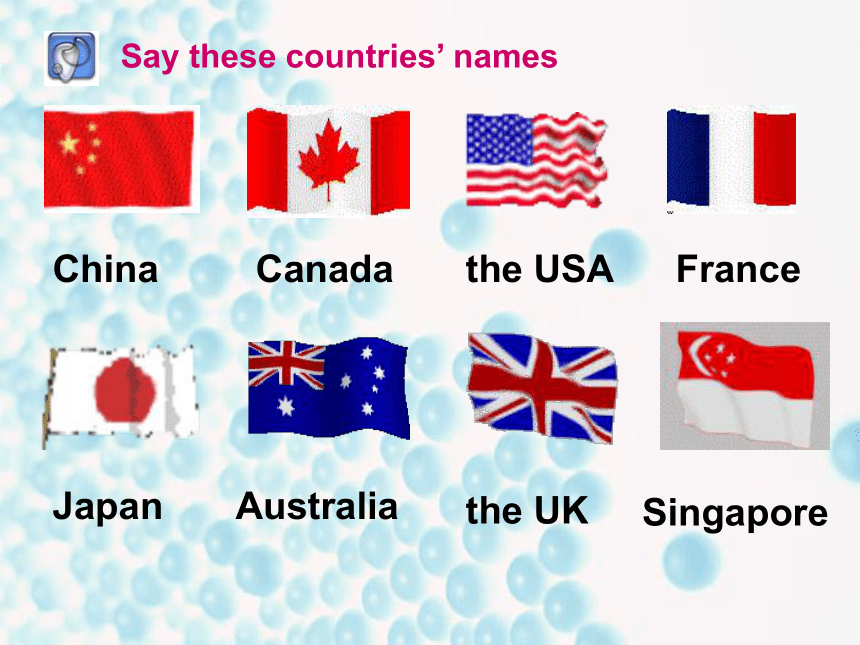
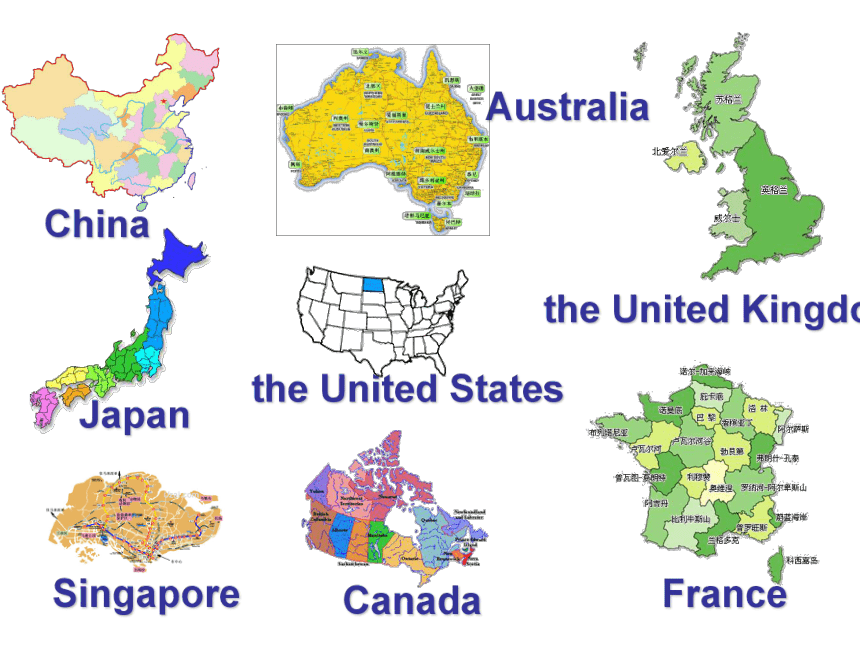
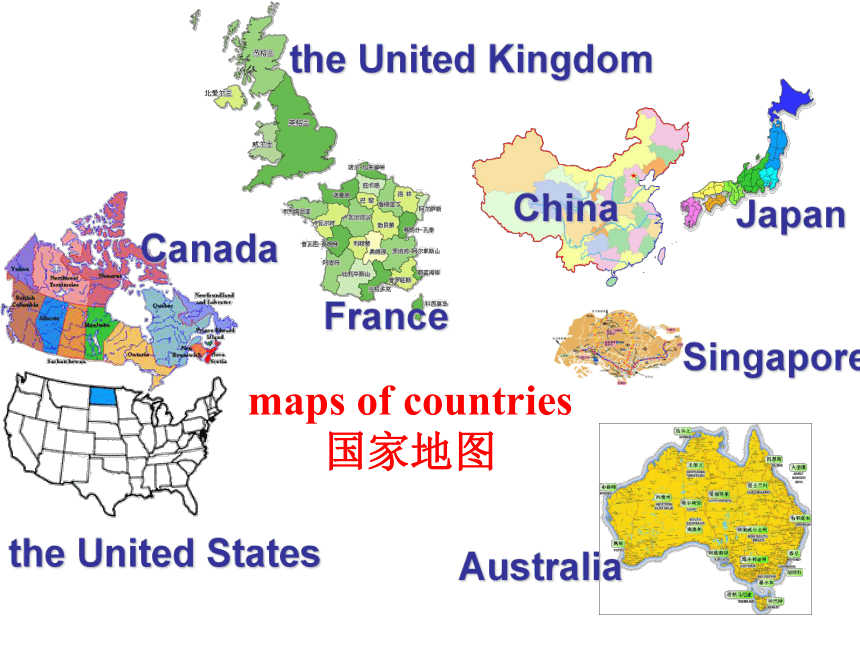
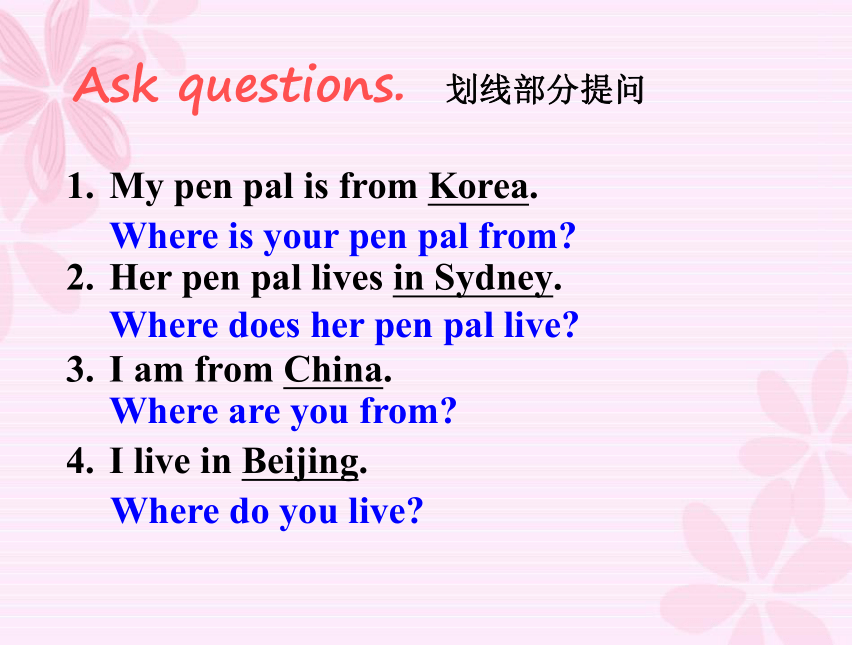
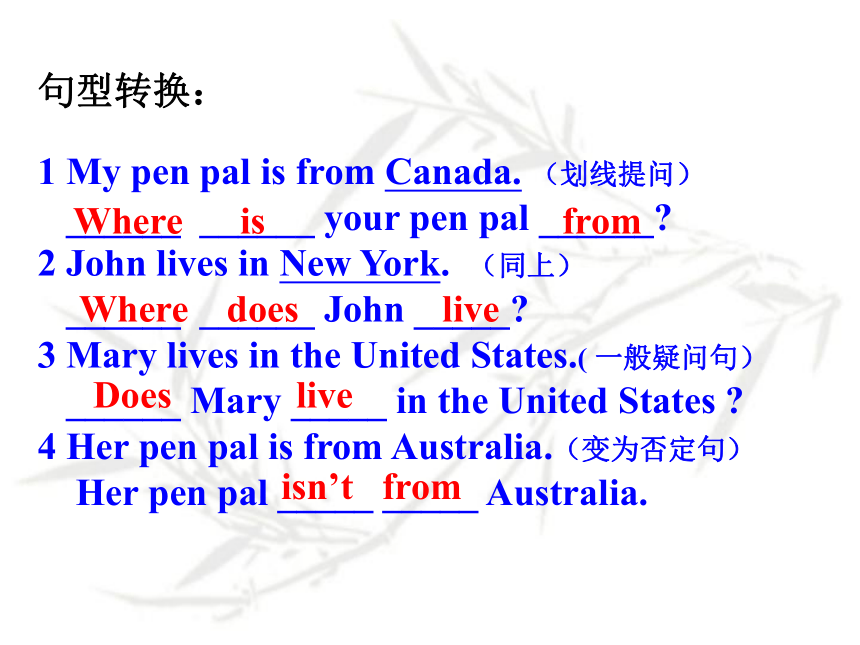
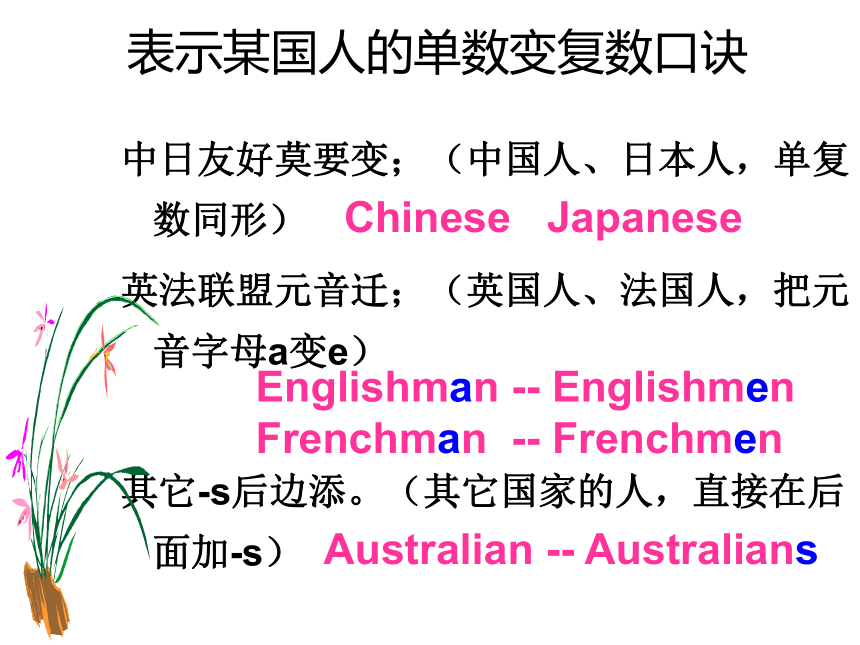
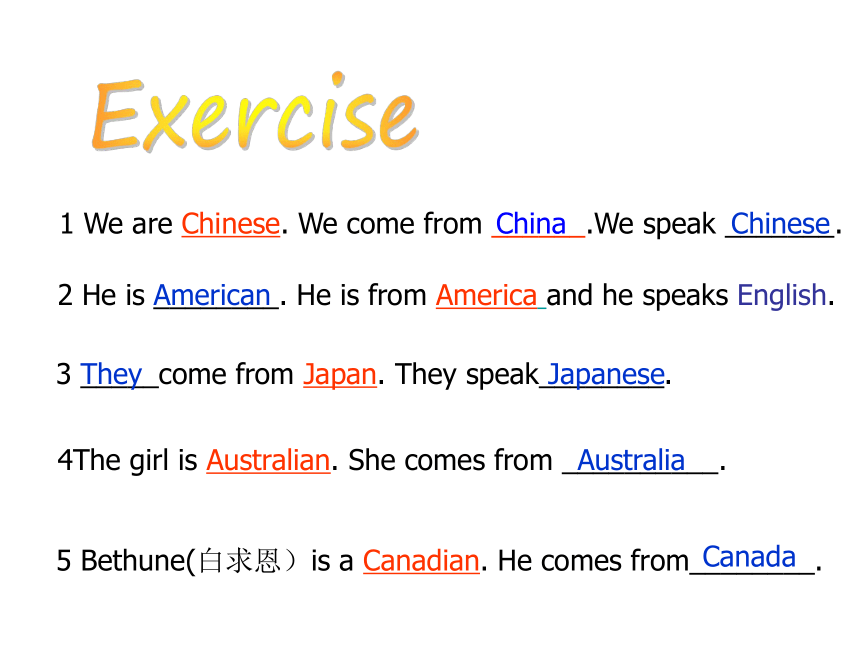
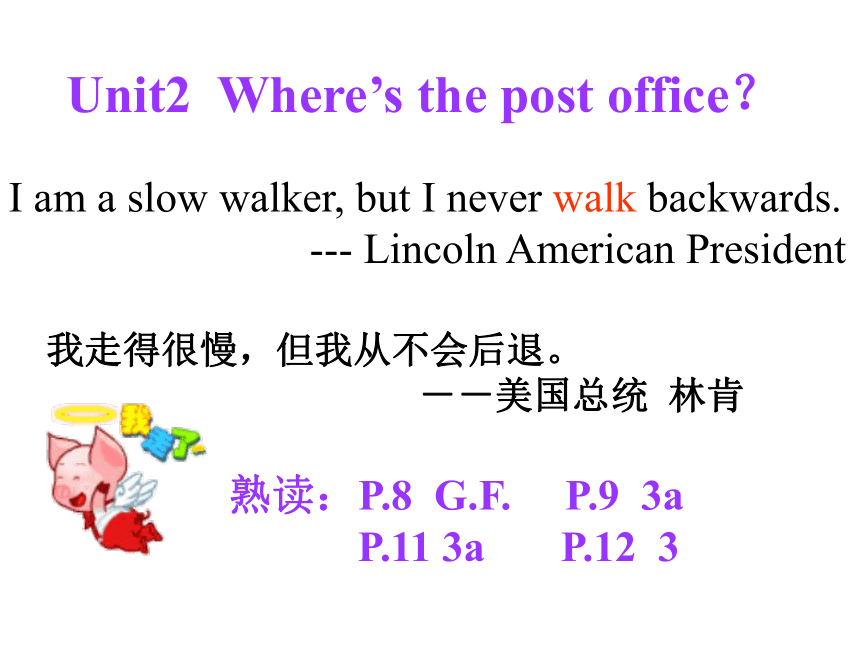
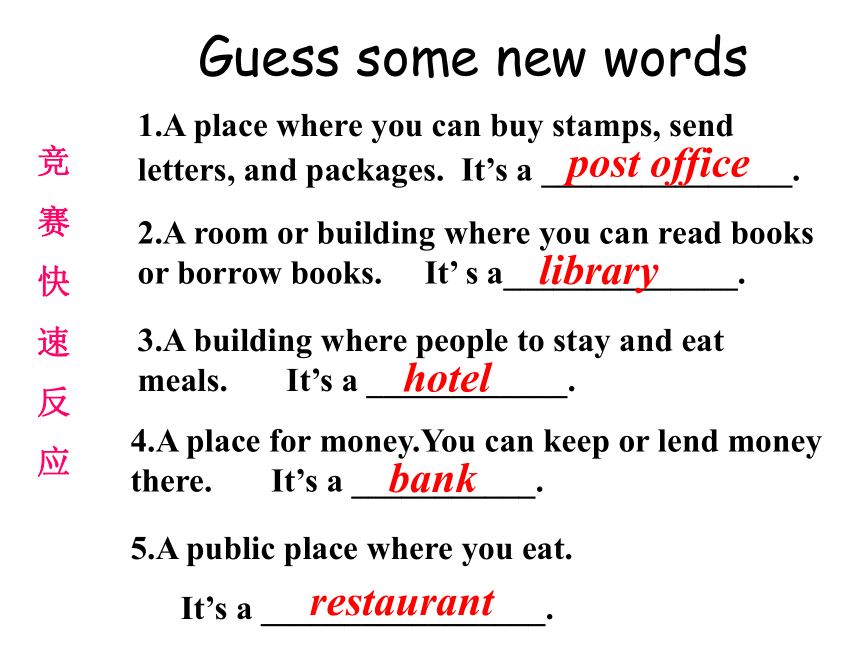
文档简介
课件87张PPT。英语中考复习
七年级下册Never say die. 永不言败。 Units 1-4 重点知识梳理English Proverb:
Better to ask the way than go astray.
问路总比迷路好。英语谚语Unit 1 Where’s your pen pal from?熟读:P.4 2a P.5 3a 3b1.pen pal = penfriend (笔友)
2.be from = come from (来自于..)
3.the United States = the USA = America (美国)
4.the United Kingdom = England = Britain (英国) 5.city (单) cities (复)
6.speak + 语言 (说某种语言)
7.same (相同的) <前面常与the连用,后面接单数名词>
8.different (不同的) <后面接复数名词>
9.too (也)<位于肯定句句末> = also (也) <靠近动词>
10.too (太) <位于形容词之前>11.Where is/are sb. from? Sb. am/is/are from…….。
12.Where do/does sb. come from? Sb. come(s) from……Canadathe USAFranceJapanAustraliathe UKSingaporeChinaSay these countries’ namesChinathe United StatesAustraliathe United KingdomJapanSingaporeCanadaFranceChinathe United StatesAustraliathe United KingdomJapanSingaporeCanadaFrancemaps of countries
国家地图My pen pal is from Korea.
Her pen pal lives in Sydney.
I am from China.
I live in Beijing.
Ask questions.Where is your pen pal from? Where does her pen pal live? Where are you from? Where do you live? 划线部分提问句型转换:
1 My pen pal is from Canada. (划线提问)
______ ______ your pen pal ______?
2 John lives in New York. (同上)
______ ______ John _____?
3 Mary lives in the United States.( 一般疑问句)
______ Mary _____ in the United States ?
4 Her pen pal is from Australia.(变为否定句)
Her pen pal _____ _____ Australia. Where is fromWhere does live Does live isn’t from中日友好莫要变;(中国人、日本人,单复数同形)
英法联盟元音迁;(英国人、法国人,把元音字母a变e)
其它-s后边添。(其它国家的人,直接在后面加-s)表示某国人的单数变复数口诀Chinese JapaneseEnglishman -- Englishmen Frenchman -- Frenchmen Australian -- AustraliansExercise1 We are Chinese. We come from ______.We speak _______. 2 He is ________. He is from America and he speaks English.3 _____come from Japan. They speak________.4The girl is Australian. She comes from __________.5 Bethune(白求恩)is a Canadian. He comes from________.ChinaChineseAmericanTheyJapaneseAustraliaCanadaUnit2 Where’s the post office?I am a slow walker, but I never walk backwards.
--- Lincoln American President我走得很慢,但我从不会后退。
--美国总统 林肯熟读:P.8 G.F. P.9 3a
P.11 3a P.12 3Guess some new words1.A place where you can buy stamps, send letters, and packages. It’s a _______________. post office2.A room or building where you can read books or borrow books. It’ s a______________.library3.A building where people to stay and eat meals. It’s a ____________.hotel4.A place for money.You can keep or lend money there. It’s a ___________.bank5.A public place where you eat.
It’s a _________________.restaurant竞
赛
快
速
反
应6.A large shop where you can buy food, drinks, and other things you need.
It’s a __________________.supermarket7.A public road in a city or town.
It’s a _________.street8.When you put a coin or some kind of card,you can use the phone. It’s a ________________.pay phone9.A large open area with grass and trees in it. It’s a ____________.park10.An area next to a house with plants and flowers in it.
It’s a ____________.garden1.There is/are (有) + sth.(某物) +sw. (某处) (有某物在某处)
Sb. have/has + sth. (某物) (某人有某物)
2.next to….(贴近;靠近)
3.between….and…..(在两者之间)
4.across from…= on the other side of….(在……对面)
5.in front of…..(在…..外面的前面)
6.in the front of……(在…..里面的前面)
7.turn right/left (向右/左转)
8.on the right/left (在右/左边)
9.on one’s right/left (在某人的右/左边)
10.near here = in the neighborhood (在附近)
11.in the picture (在图中)
12.go straight (直走)
13.Go/Walk along/down…..(沿着…..走)There beUnit 3Prep.14. 问路:
a. Where’s the…….,please? (请问,……?在哪儿?)
b. Is there a/an……near here/in the neighborhood?
(这儿附近有…….吗?)
15.a. take the + 序数词 +turning +on the right/left
b. turn right/left at the + 序数词 + turning.
16.Excuse me (打扰一下;劳驾一下)
17.You’re welcome = That’s all right. =Not at all. (不用谢)Unit 318.clean (干净的) dirty (脏的) 19.new(新的) old(旧的) 20.big (大的) small (小的) 21.quiet(安静) busy(忙的)22.Welcome to…….(欢迎到…….)
23.the way to….(去…..的路)
24.the beginning of…… (…..的开始)
25.go through (穿过)
26.take/have a walk = go for a walk (散步)
27.take a taxi/bus (坐的士/汽车)
28.with (和…一起;有着)
29.enjoy doing sth. (喜欢做某事)Unit 3inonnext toin front ofbehindbetweenA:Where is the…?
B:She is in/….
It is …Is there a park ____ here? Yes , there is.
There’s a pay phone _____ Center Street.
The supermarket is _________ the school and the park.
My home is across_______ the library.
lily sits____ to me in the classroom.
There is a park _______ the neighborhood.
There is a video arcade_______ Fifth Avenue.nearonbetweenfromnextinonExercise go straight Turn left Turn right go up … go down … go = walk-Excuse me.Is there a hospital in the neighborhood?
-Yes, there is. Just go straight and turn right. It’s down Center Street on the right. Center ST-Excuse me.Is there a hotel in the neighborhood?
-Yes, there is. Just go straight down Bridge Street and turn left . The hotel is on the left. It’s across from the bank. HOTEL Bridge ST BANK GBFDCEAPARK STREETYou are at A. Go straight down the Park Street. It’s on the right. Now you are at _______.
You are at A. Go straight and turn right. It’s down the City Street on the right. Now you are at _____.
You are at A. Go straight and turn left and right. Now you are at _______. CITY STREETBCFLook at the picture. There’s a school in the picture. It’s________ School Street. The book store is______ the school. The bank is ______ _______ the school. The pay phone is_______ the school and the hospital.
Can you see the post office? It’s_____ ______the school. There is a supermarket. It’s_____ ____ ____ the park. on behind next to between across from in front ofAsking the WayIs there a …near here?
Where is the nearest …?
Can you tell me how I can get to the…?
Can you tell me how to get to the …?
Could you tell me the way to the …, please?
Which is the way to…?
Do you know the way to… Showing the WayGo down this street. / Walk along this road.
Take the first turning on the right. /
Turn left at the first crossing.
It’s on your right/left. / It’s next to /between--and--…
Go across the bridge./Cross the bridge.
You will see---in front of you.
You can’t miss it.Excuse
me.小结1. 某地有某物。There is + a/an + n. + in the ….1 有2 某物3 在某地
(介词短语)There are + (some) + n.-s + in the ….在桌子下有一本书。
在书橱里有一些书。
在地上有一个篮球。
在椅子旁边有一些篮球。
在门的后边有一个书包。
在小汽车的前边有一些小孩。There is a book under the table (desk). some booksThere are in the bookcase. a basketballThere is on the floor. some basketballsThere are near the chair. a backpackThere is behind the door. some kidsThere are in front of the car.2. 某地没有某物。There isn’t + a/an + n. + in the ….1 没有2 某物3 在某地
(介词短语)There aren’t + (any) + n.-s + in the ….在梳妆台上没有手表.
在抽屉里没有(一些)字典.
在附近没有邮局.
在超市的对面没有饭馆.
在第六条大街上没有银行.
在我们学校没有外国学生.There isn’t a watch on the dresser.There aren’t any dictionaries in the drawer.There isn’t a post office in the neighborhood.There isn’t a restaurant across from the supermarket.There isn’t a bank on Sixth Avenue.There aren’t any foreign students in our school.3. 某地有某物吗?Is there + a/an + n. + in the …?1 有2 某物3 在某地吗
(介词短语)Are there + (any) + n.-s + in the …?在图书馆旁边有一个投币电话吗?
在第五条大街上有一家超市吗?
在你家附近有宾馆吗?
在宾馆对面有银行吗?
在邮局后边有饭馆吗?
在你家有兄弟姐妹吗?Is there a pay phone next to the library?Is there a supermarket on Fifth Avenue?Is there a hotel near your home?Is there a bank across from the hotel?Is there a restaurant behind the post office?Are there any brothers or sisters in your family?Unit 2WORK MAKES US HAPPY!As a man sows, so he shall reap.
种瓜得瓜,种豆得豆。 Unit 3 Why do you like koalas? 熟读:P.16 3 P.17 3a 3b1.kind of = a little bit (有几分)
2.a kind of….(一种….)
3.all kinds of…..(各种各样的…..)
4.be afraid of….(害怕….)
5.leaf (单) leaves (复)
6.at night = in the evening (在晚上)
7.smart = clever (聪明)
8.during the day (白天期间)
9.beautiful ugly (丑陋的) 一、根据句意完成单词1、I can see many a________ in the zoo.
2、The elephant is cute and f_______.
3、There’re many k___ of birds in the tree.
4、I like lying on the g____ on a sunny day.
5、Mary thinks watching TV is r________.
6、The dolphin is very b________.
We like it very much.
7、Some animals like to eat m______.
8、Hainan is in the s____ of China.
9、There are two z___ in our city.
10、Tom’s brother is a c____ boy.nimalsriendlyindsrasselaxingeautifuleatoosouthlever1. 让我们先看熊猫吧。
Let’s ____ the ______ ____.2.你还喜欢其他的什么动物?
_____ _____ ______ do you like? 3. 他儿子有几分怕生。
His son is ____ ____ _______.4. 他太懒,他每天睡觉放松20个小时。
He’s too ____, he ______ and _______ _____ _____
every day.5. 为什么那只狗看着我?因为你可爱。
___ is the dog ______ __ me? ________ you’re ____.二、完成句子see pandas firstWhat other animalskind of shy lazy sleeps relaxes twenty hoursWhy looking at Because cute 6. 她喜欢和朋友们一起玩耍,也喜欢看电视。
She likes to ____ ___ her friends and _____ TV.7. 玲玲很害羞,所以请保持安静。
Lingling is very ____,__ please ____ _____.8. 他白天期间睡觉,但是晚上起来吃树叶。
He sleeps ______ ___ ____, but __ _____ he ___ ____
and ____ ______.9. Jack最喜欢的动物是企鹅。
Jack’s ______ ______ are ________.10. 狗非常的友好而且聪明。
The dogs are very _______ and _____.play with watchshy so keep quiet during the day at night gets up
eats leavesfavorite animals penguins friendly clever 三、句型转换1、Koalas like to eat leaves.(改为一般疑问句,作肯定回答)
___ koalas ____ to eat leaves? Yes, ____ ___.2、How do you like the dolphins?(同义句)
____ do you _____ __ the dolphins?3、We like the penguin because it’s very fun.(画线提问)
_____ ___ you like the penguin?4、How about going for a walk?(同义句)
____ ____ _____ for a walk?
____ go for a walk.5、A lion eats meat.(用grass改为选择疑问句)
_____ a lion___ meat ___ grass?Do like they do What think of Why do What about goingLet’sDoes eat orUnit 4 I want to be an actor1.want to be a/an….(想要当…..)
2.shop assistant (店员)
3.a.What + do/does + sb. +do?
b. What + be +sb.?
c. What’s + one’s +job ? (某人是干什么工作的?)
4.give sth. to sb. = give sb. sth. (把某物给某人)
5.TV station (电视台) 6.police station (派出所)
7.in a hospital (在医院里) 8.in hospital (住院)
9.go out (出去) 10.go back (回去)
11.come out (出来) 12.come back (回来)熟读:P.21 3a P.23 3a P.24 3a15.in the day (在白天)
16.thief (单) thieves (复)
17.hard = difficult (困难) easy (简单)
18.be in (参加;在家)
19.school play (校园剧)
20.young (年轻的) old (老的)
21.put on (穿上) <动作> wear (穿着) <状态>
22.listen to…. (听……) <对象>
hear (听见) <结果>
23.look at….(看……) <对象>
see (看见) <结果>
一、根据句意完成单词1、Wang Xiaoya is a r_______ from CCTV.
2、Young students often wear u_______ at school.
3、If you are ill, you must go to the h________.
4、Don’t t____! The teacher is coming.
5、Jim’s father likes to read m________ after work.
6、My grandma often tells me interesting s________.
7、Do you want a busy but e_______ job?
8、T______ don’t like the police.
9、My daughter is only 4 years old. She is so y______
that she can’t go to school.
10、Being a policeman is kind of d________.eporterniformsospitalalkagazinestoriesxcitingounghievesangerous二、句型转换1、Ann’s sister works in a hospital.(画线提问)
______ ____ Ann’s sister _____?2、His mother is a nurse.(画线提问)
_____ __ his mother’s ____?
_____ ____ his mother do?3、I want to be a reporter because it’s interesting.
_____ ___ you _____ ___ ___ a reporter? (画线提问)4、Please give me an apple.(同义句)
Please____ an apple __ __.5、The girl wants to be a movie star.(改为一般疑问句并做肯定回答)
_____ the girl _____ to be a movie star?
Yes, ___ _____.Where does workWhat is jobWhy do want to be give to meDoes want What doesshe does6、She teaches in No.14 Middle School.(改为否定句)
She ______ _____ in No.14 Middle School.7、I meet people every day.(画线提问)
_____ ___ you ___ every day?8、Li Yong works in a TV station. (改为否定疑问句)
_______ Li Yong ____ in a TV station?doesn’t teachWhat do doDoesn’t workUnits 5-8 重点知识梳理English Proverb:
A little knowledge is a dangerous thing.
一知半解,自欺欺人。 英语谚语Unit 5 I’m watching TV1.现在进行时: a.现在正在发生或进行的动作.
b.构成: 主语 + be动词 + 动词的现在分词 <两者缺一不可>
c.动词现在分词的构成:
<1>一般直接在词尾加“ing”;
<2>以不发音“e”结尾的,去 “e”加 “ing”;
<3>双写最后一个字母,再加 “ing”; eg: begin, get, let, sit, put, run, drop, hit, forget, swim, stop, travel, plan, shop;
d.现在进行时的标志词:look, listen, now, It’s + 时刻2. do one’s homework = do homework (做家庭作业) 3. a. 看电视/比赛用“watch”; b. 看书/报纸/杂志用“read”; 4. wait for….(等候….) 5. TV show (电视节目) 6. at school/home/work (在学校/家/工作) 7. Make telephone calls (打电话) a. Hello, here is/it’s + 电话号码 (你好!这儿是…) b. Hello, may/can/could I speak to…,please? (你好,我可以与……通话吗?) c. Who’s that (speaking) ? (你是谁?) d. This is…(speaking) . (我是…..) e. Is that…(speaking)? / Is… there ? (你是….吗?) 熟读:P26 GF P27 3a P.29 3a 3b?1.?What?is?she?doing?? ????She?__________.?(dance) ?2.?What?are?they?doing?? ????They?___________.?(swim) ?3.?What?is?the?girl?doing?? ????She?_________.?(cook) ?4.?What?are?they?doing?? ????They?_________(play)
volleyball.? ?5.?What?is?the?girl?doing?? ????She?________.?(write) is dancingare swimmingis cookingare playingis writing1.Mother___ ______ lunch now.(make)
2.Listen!The teacher ___ ______ ______ her students . (talk to/ with)
3.I __ _______ __ music now .(listen to)
4.Look!They ___ _________ at school . (swim)ismakingistalkingtowithamlisteningtoareswimming5.___ you _____ kites ? (fly)
6.Some children __ _______
at school . (run)
7.Mary __ ______ ___ a bus at a bus stop . (wait)
8.Many people ___ ______ photos in the park . (take) AreflyingarerunningiswaitingforaretakingUnit 6Unit 6 It’s raining.1.cloud (云) cloudy (多云的)
wind (风) windy (有风的)
sun (太阳) sunny (晴朗的)
rain (雨/下雨) rainy (下雨的)
snow (雪/下雪) snowy (下雪的)
2.询问天气: What’s the weather like?
= How’s the weather ?
It’s + 气候.
3.How’s it going ? (情况怎样了?)
4.pretty (相当) adv.= quite / very (十分)
pretty (漂亮) adj. = beautiful
5.hot (热) cold (冷) 6.cool (凉爽) warm (暖和)
7.humid (潮湿) dry (干燥) 8.lie (躺) lying (现在分词)熟读: P 32 GF P.35 3a 3b9.Thanks for sth./doing sth. (因….而感谢) 10.on vacation (度假) 11.on the beach (在沙滩上) 12.take photos/pictures (照相) 13.a group of…(一群…) <后接复数名词> 14.beach volleyball (沙滩排球) 15.be surprised (吃惊的) to do sth. 16.have a good/great/nice time = have fun (玩得高兴) 17.everyone (每人) someone (某人) everything (一切) something (某物) nobody (没有人) <作主语时,当作第三人称单数> 18.want sb. to do sth. (想要某人做某事) 19.in order to……(为了….) What’s Lisa doing? How’s the weather? What’s Jim doing? How’s the weather? What’re they doing? Can you guess where they are? She’s cooking.It’s sunny.He’s watching TV.It’s snowing.They’re making a phone call.Lisa is in Hawaii and Jim is in Moscow.细心选一选1.It’s eight o’clock. Jim’s father __TV.
A. is watching B. are watching
C. watch D. to watch
2.____is the weather there?It’s windy.
A.What B.How C.What’s D.how
3.____the weather like today? Cloudy.
A.How’s B.What does
C What D.What’s
4.What’s the weather like today?____
A.It’s rain. B.It’s raining.
C. It rainy. D. It’s wind.ABDB仔细想一想When the sun comes out, it’s_______.
When there are some clouds, it’s________.
When it’s raining, it’s______.
When it’s snowing, it’s______.
When the wind is blowing(吹), it’s_____.sunnycloudyrainysnowywindy3.What are they doing?
They read newspapers.1.What’s the weather like today?
It is cloud .火眼金睛辨正误yareing2.How is the weather like today?
It’s raining.Unit 7Don’t judge people by their appearances!
别以貌取人 Motto:座右铭;格言;Unit 7 What does he look like ? 1. short hair (短发) long hair (长发)
2. straight hair (直发) curly hair (卷发)
3. medium height (中等个子)
4. medium build (中等身材)
5. What does/do + sb. + look like? (某人长什么样?)
a. sb. + be + 形容词 / b. sb. has/have + 名词
6. look like = be like (看起来像…….)
7. always (总是) never (决不)
8. stop doing sth. (停止做某事)
stop to do sth. (停下来做…..)
9. tell jokes/stories (讲笑话/故事)
10. remember (记得) forget (忘记)熟读:
P.42 3 GF P.43 3a P.45 3a 3bwear glasses is bald has a beard has a mustachecurly hair blonde hair long straight hair heavy medium build thin Design your new image!
(设计你的新形象)Have a new look (外表)!hair描述头发
漂亮+长短+形状+颜色brown blonde black white red curly
straightshort
longbeautiful一头漂亮乌黑的长发
beautiful long black hair
她有一头漂亮的短的金黄色的卷发。
She has beautiful short curly blonde hair.What does he look like? h__ v__.He isea y词汇 ( Mary 有个淘气的小弟弟,他把作文中的一些字涂掉了,还好,每个词留了开头一个字母,你能帮他补全吗?)
Miss Li is our English teacher .Do you k_______ her? And what does she l_____ like? Let me tell you. She’s m_________ height, but a little b______ heavy. She has short brown and c_______ hair. She always wears a pair of g_______ on her face. She is g________ , we like her very much. She loves to tell j_______, and she is very p_______ in our school. Can you r________ ?nowookediumiturlylassesood-lookingokesopularememberUnit 8 I’d like some noodles 1. I’d like = I would like she’d like = she would like
2.would like = want sth./to do sth. (想要某物/做某事)
3.clean (干净的) <形容词> dirty (脏的)/ (打扫) <动词>
4.beef and tomato noodles (牛肉西红柿面)
5.chicken and cabbage noodles (鸡肉白菜面)
6.potato and mutton noodles (土豆羊肉面)
7.What kind of….would you like ? (你想要哪种……?)
What would you like/do you want ?(你想要什么?)
8. What size bowl of noodles would you like?
(你想要多大碗面?)
I’d like a small/medium/large bowl of noodles.
9. as well as…(也;而且)
10. green tea (绿茶)
11. orange juice (桔汁)
12.a. or (或者) <用于选择疑问句中>
b. or (和) <用于连接否定中并列内容>熟读:
P.48 2b GF P.49 3a P.51 3a 3b 不可数名词:(前面不能用a,an等来修饰) ①液体类(water):tea(茶), water(汤),milk(牛奶),orange(橘汁) ②肉类(meat):beef(牛肉),pork(猪肉),mutton(羊肉) ③粉末类:bread(面包) , ④抽象名词类:news(新闻,消息),information(消息),money (钱),advice(建议),friendship(友谊) ,work(工作),homework(家庭作业), help(帮助) ,fun (乐趣), price (价格)
⑤食物类(food): rice(大米,米饭) ,porridge(粥), tofu(豆腐) 巧辨不可数名词歌诀:可数不可数好分辨,名词所示物分两半
如每半不能叫原名,那该词可数最公平.
每半还能把原名叫,不可数名词就遇到
有的名词是两面堵,意变不可数为可数 修饰名词的词
1.只能修饰可数名词复数的词 数词,many,several,a few,few,a (large)number of, 如:two apples两个苹果,several books几本书 a large number of students 许多学生,
2.只能修饰不可数名词的词 much,a little,little,a great deal of,
如 much water 许多水,a little time一点儿时间 3.既能修饰可数名词复数又能修饰不可数名词的词 a lot of,lots of,plenty of,表示容器的量词 如 a lot of books 许多书,a lot of milk 许多牛奶,
two boxes of apples 两箱苹果,three cups of tea 三杯茶不可数名词计量的表达: ①个数单位词:piece (张、片、块、条), ②容器单位词:bottle(瓶),bag(包),box(盒、箱), ③类别单位词:kind( 种、类) ④度量衡单位词:kilo(千克、公斤)Exercises:
Would you like ____ hot soup?
A. little B. much C. some D. any
2. –Would you like to come to dinner today?
-I’d like to, ___ I’m too busy.
A. and B. so C. but D. as
3. Mario likes ____ cold hot dogs.
A. eat B. eating C. ate D. is eating
4. I would like ___ in my noodles.
A. tomatoes and mutton B. tomatoes and muttons
C. tomato and mutton D. tomato and muttons
5. They would like ____ noodles.
A. tomatoes and mutton B. tomatoes and muttons
C. tomato and mutton D. tomato and muttons(c)(c)(B)(A)(C)6. –Bob,would you like to come to the party? -________.
A. Yes, I would. B. Yes, I’d love to. C. No, I wouldn’t. D. No, I don’t.
7. If you are lost in the forest, what ____ you do?
A. would like B. like C. would D. can
8. -Would you like something to drink? - _______.
A. No, thanks. B. Yes, thanks. C. No, just a little. D. It is not good.
9. Don’t eat hamburgers ____ drink tea in your bedroom!
A. and B. or C. with D. /
10. -Which scarf would you like best? -I’d like _____.
A. red ones B. the red one C. a tie D. ties
11. We would like _____ small hamburgers.
A. eating B. eat C. to eat D.ate
12. –What size pizza would you like? -I’d like _____ pizza.
A. large B. a large cup of C. a large D. large size(B)(C)(A)(B)(B)(C)(C)Thank you! Experience is the father of wisdom
and memory the mother.
经验是智慧之父,记忆是智慧之母。 Units 9-12 重点知识梳理English Proverb:
英语谚语All things are easy that are done willingly.
做事乐意,诸事容易。 Unit 9 How was your weekend ?1.一般过去时:过去发生的动作或存在的状态。
a.构成:由be动词/情态动词/实义动词的过去式构成。
b.规则动词过去式的构成:<1>一般在动词词尾加 ed;
<2>以“e”结尾的动词,加 “d”构成;
<3>辅音字母加 “y”结尾的动词,要先变 “y”为 “i”,再加 “ed”;
<4>重读闭音节结尾的动词,先双写最后一个字母,再加 “ed”; eg: stop, plan, travel, drop, shop
c.过去式的标志: yesterday (昨天) /last + 单数名词 (上一个… 时间段 + ago (…以前)/just now = a moment ago (刚才)巧记动词过去时态动词一般过去时,表示过去发生的事;
be用was或用were, have,has变had;
谓语动词过去式,过去时间作标志;
一般动词加-ed,若是特殊得硬记。
否定句很简单,主语之后didn’t添;
疑问句也不难,did放在主语前;
如果谓语之前有did,谓语动词需还原;
动词若是was,were,否定就把not添。2.help sb. with sth. (在….方面帮助某人)
3.help sb. (to) do sth. (帮助某人做某事)
4.do some +动词 “ing” (做点…….) eg; do some reading
5.stay at home (呆在家) 6.have a party (开晚会)
7.visit (a person) (拜访…..) 8.talk show (访谈节目)
9.study for the
七年级下册Never say die. 永不言败。 Units 1-4 重点知识梳理English Proverb:
Better to ask the way than go astray.
问路总比迷路好。英语谚语Unit 1 Where’s your pen pal from?熟读:P.4 2a P.5 3a 3b1.pen pal = penfriend (笔友)
2.be from = come from (来自于..)
3.the United States = the USA = America (美国)
4.the United Kingdom = England = Britain (英国) 5.city (单) cities (复)
6.speak + 语言 (说某种语言)
7.same (相同的) <前面常与the连用,后面接单数名词>
8.different (不同的) <后面接复数名词>
9.too (也)<位于肯定句句末> = also (也) <靠近动词>
10.too (太) <位于形容词之前>11.Where is/are sb. from? Sb. am/is/are from…….。
12.Where do/does sb. come from? Sb. come(s) from……Canadathe USAFranceJapanAustraliathe UKSingaporeChinaSay these countries’ namesChinathe United StatesAustraliathe United KingdomJapanSingaporeCanadaFranceChinathe United StatesAustraliathe United KingdomJapanSingaporeCanadaFrancemaps of countries
国家地图My pen pal is from Korea.
Her pen pal lives in Sydney.
I am from China.
I live in Beijing.
Ask questions.Where is your pen pal from? Where does her pen pal live? Where are you from? Where do you live? 划线部分提问句型转换:
1 My pen pal is from Canada. (划线提问)
______ ______ your pen pal ______?
2 John lives in New York. (同上)
______ ______ John _____?
3 Mary lives in the United States.( 一般疑问句)
______ Mary _____ in the United States ?
4 Her pen pal is from Australia.(变为否定句)
Her pen pal _____ _____ Australia. Where is fromWhere does live Does live isn’t from中日友好莫要变;(中国人、日本人,单复数同形)
英法联盟元音迁;(英国人、法国人,把元音字母a变e)
其它-s后边添。(其它国家的人,直接在后面加-s)表示某国人的单数变复数口诀Chinese JapaneseEnglishman -- Englishmen Frenchman -- Frenchmen Australian -- AustraliansExercise1 We are Chinese. We come from ______.We speak _______. 2 He is ________. He is from America and he speaks English.3 _____come from Japan. They speak________.4The girl is Australian. She comes from __________.5 Bethune(白求恩)is a Canadian. He comes from________.ChinaChineseAmericanTheyJapaneseAustraliaCanadaUnit2 Where’s the post office?I am a slow walker, but I never walk backwards.
--- Lincoln American President我走得很慢,但我从不会后退。
--美国总统 林肯熟读:P.8 G.F. P.9 3a
P.11 3a P.12 3Guess some new words1.A place where you can buy stamps, send letters, and packages. It’s a _______________. post office2.A room or building where you can read books or borrow books. It’ s a______________.library3.A building where people to stay and eat meals. It’s a ____________.hotel4.A place for money.You can keep or lend money there. It’s a ___________.bank5.A public place where you eat.
It’s a _________________.restaurant竞
赛
快
速
反
应6.A large shop where you can buy food, drinks, and other things you need.
It’s a __________________.supermarket7.A public road in a city or town.
It’s a _________.street8.When you put a coin or some kind of card,you can use the phone. It’s a ________________.pay phone9.A large open area with grass and trees in it. It’s a ____________.park10.An area next to a house with plants and flowers in it.
It’s a ____________.garden1.There is/are (有) + sth.(某物) +sw. (某处) (有某物在某处)
Sb. have/has + sth. (某物) (某人有某物)
2.next to….(贴近;靠近)
3.between….and…..(在两者之间)
4.across from…= on the other side of….(在……对面)
5.in front of…..(在…..外面的前面)
6.in the front of……(在…..里面的前面)
7.turn right/left (向右/左转)
8.on the right/left (在右/左边)
9.on one’s right/left (在某人的右/左边)
10.near here = in the neighborhood (在附近)
11.in the picture (在图中)
12.go straight (直走)
13.Go/Walk along/down…..(沿着…..走)There beUnit 3Prep.14. 问路:
a. Where’s the…….,please? (请问,……?在哪儿?)
b. Is there a/an……near here/in the neighborhood?
(这儿附近有…….吗?)
15.a. take the + 序数词 +turning +on the right/left
b. turn right/left at the + 序数词 + turning.
16.Excuse me (打扰一下;劳驾一下)
17.You’re welcome = That’s all right. =Not at all. (不用谢)Unit 318.clean (干净的) dirty (脏的) 19.new(新的) old(旧的) 20.big (大的) small (小的) 21.quiet(安静) busy(忙的)22.Welcome to…….(欢迎到…….)
23.the way to….(去…..的路)
24.the beginning of…… (…..的开始)
25.go through (穿过)
26.take/have a walk = go for a walk (散步)
27.take a taxi/bus (坐的士/汽车)
28.with (和…一起;有着)
29.enjoy doing sth. (喜欢做某事)Unit 3inonnext toin front ofbehindbetweenA:Where is the…?
B:She is in/….
It is …Is there a park ____ here? Yes , there is.
There’s a pay phone _____ Center Street.
The supermarket is _________ the school and the park.
My home is across_______ the library.
lily sits____ to me in the classroom.
There is a park _______ the neighborhood.
There is a video arcade_______ Fifth Avenue.nearonbetweenfromnextinonExercise go straight Turn left Turn right go up … go down … go = walk-Excuse me.Is there a hospital in the neighborhood?
-Yes, there is. Just go straight and turn right. It’s down Center Street on the right. Center ST-Excuse me.Is there a hotel in the neighborhood?
-Yes, there is. Just go straight down Bridge Street and turn left . The hotel is on the left. It’s across from the bank. HOTEL Bridge ST BANK GBFDCEAPARK STREETYou are at A. Go straight down the Park Street. It’s on the right. Now you are at _______.
You are at A. Go straight and turn right. It’s down the City Street on the right. Now you are at _____.
You are at A. Go straight and turn left and right. Now you are at _______. CITY STREETBCFLook at the picture. There’s a school in the picture. It’s________ School Street. The book store is______ the school. The bank is ______ _______ the school. The pay phone is_______ the school and the hospital.
Can you see the post office? It’s_____ ______the school. There is a supermarket. It’s_____ ____ ____ the park. on behind next to between across from in front ofAsking the WayIs there a …near here?
Where is the nearest …?
Can you tell me how I can get to the…?
Can you tell me how to get to the …?
Could you tell me the way to the …, please?
Which is the way to…?
Do you know the way to… Showing the WayGo down this street. / Walk along this road.
Take the first turning on the right. /
Turn left at the first crossing.
It’s on your right/left. / It’s next to /between--and--…
Go across the bridge./Cross the bridge.
You will see---in front of you.
You can’t miss it.Excuse
me.小结1. 某地有某物。There is + a/an + n. + in the ….1 有2 某物3 在某地
(介词短语)There are + (some) + n.-s + in the ….在桌子下有一本书。
在书橱里有一些书。
在地上有一个篮球。
在椅子旁边有一些篮球。
在门的后边有一个书包。
在小汽车的前边有一些小孩。There is a book under the table (desk). some booksThere are in the bookcase. a basketballThere is on the floor. some basketballsThere are near the chair. a backpackThere is behind the door. some kidsThere are in front of the car.2. 某地没有某物。There isn’t + a/an + n. + in the ….1 没有2 某物3 在某地
(介词短语)There aren’t + (any) + n.-s + in the ….在梳妆台上没有手表.
在抽屉里没有(一些)字典.
在附近没有邮局.
在超市的对面没有饭馆.
在第六条大街上没有银行.
在我们学校没有外国学生.There isn’t a watch on the dresser.There aren’t any dictionaries in the drawer.There isn’t a post office in the neighborhood.There isn’t a restaurant across from the supermarket.There isn’t a bank on Sixth Avenue.There aren’t any foreign students in our school.3. 某地有某物吗?Is there + a/an + n. + in the …?1 有2 某物3 在某地吗
(介词短语)Are there + (any) + n.-s + in the …?在图书馆旁边有一个投币电话吗?
在第五条大街上有一家超市吗?
在你家附近有宾馆吗?
在宾馆对面有银行吗?
在邮局后边有饭馆吗?
在你家有兄弟姐妹吗?Is there a pay phone next to the library?Is there a supermarket on Fifth Avenue?Is there a hotel near your home?Is there a bank across from the hotel?Is there a restaurant behind the post office?Are there any brothers or sisters in your family?Unit 2WORK MAKES US HAPPY!As a man sows, so he shall reap.
种瓜得瓜,种豆得豆。 Unit 3 Why do you like koalas? 熟读:P.16 3 P.17 3a 3b1.kind of = a little bit (有几分)
2.a kind of….(一种….)
3.all kinds of…..(各种各样的…..)
4.be afraid of….(害怕….)
5.leaf (单) leaves (复)
6.at night = in the evening (在晚上)
7.smart = clever (聪明)
8.during the day (白天期间)
9.beautiful ugly (丑陋的) 一、根据句意完成单词1、I can see many a________ in the zoo.
2、The elephant is cute and f_______.
3、There’re many k___ of birds in the tree.
4、I like lying on the g____ on a sunny day.
5、Mary thinks watching TV is r________.
6、The dolphin is very b________.
We like it very much.
7、Some animals like to eat m______.
8、Hainan is in the s____ of China.
9、There are two z___ in our city.
10、Tom’s brother is a c____ boy.nimalsriendlyindsrasselaxingeautifuleatoosouthlever1. 让我们先看熊猫吧。
Let’s ____ the ______ ____.2.你还喜欢其他的什么动物?
_____ _____ ______ do you like? 3. 他儿子有几分怕生。
His son is ____ ____ _______.4. 他太懒,他每天睡觉放松20个小时。
He’s too ____, he ______ and _______ _____ _____
every day.5. 为什么那只狗看着我?因为你可爱。
___ is the dog ______ __ me? ________ you’re ____.二、完成句子see pandas firstWhat other animalskind of shy lazy sleeps relaxes twenty hoursWhy looking at Because cute 6. 她喜欢和朋友们一起玩耍,也喜欢看电视。
She likes to ____ ___ her friends and _____ TV.7. 玲玲很害羞,所以请保持安静。
Lingling is very ____,__ please ____ _____.8. 他白天期间睡觉,但是晚上起来吃树叶。
He sleeps ______ ___ ____, but __ _____ he ___ ____
and ____ ______.9. Jack最喜欢的动物是企鹅。
Jack’s ______ ______ are ________.10. 狗非常的友好而且聪明。
The dogs are very _______ and _____.play with watchshy so keep quiet during the day at night gets up
eats leavesfavorite animals penguins friendly clever 三、句型转换1、Koalas like to eat leaves.(改为一般疑问句,作肯定回答)
___ koalas ____ to eat leaves? Yes, ____ ___.2、How do you like the dolphins?(同义句)
____ do you _____ __ the dolphins?3、We like the penguin because it’s very fun.(画线提问)
_____ ___ you like the penguin?4、How about going for a walk?(同义句)
____ ____ _____ for a walk?
____ go for a walk.5、A lion eats meat.(用grass改为选择疑问句)
_____ a lion___ meat ___ grass?Do like they do What think of Why do What about goingLet’sDoes eat orUnit 4 I want to be an actor1.want to be a/an….(想要当…..)
2.shop assistant (店员)
3.a.What + do/does + sb. +do?
b. What + be +sb.?
c. What’s + one’s +job ? (某人是干什么工作的?)
4.give sth. to sb. = give sb. sth. (把某物给某人)
5.TV station (电视台) 6.police station (派出所)
7.in a hospital (在医院里) 8.in hospital (住院)
9.go out (出去) 10.go back (回去)
11.come out (出来) 12.come back (回来)熟读:P.21 3a P.23 3a P.24 3a15.in the day (在白天)
16.thief (单) thieves (复)
17.hard = difficult (困难) easy (简单)
18.be in (参加;在家)
19.school play (校园剧)
20.young (年轻的) old (老的)
21.put on (穿上) <动作> wear (穿着) <状态>
22.listen to…. (听……) <对象>
hear (听见) <结果>
23.look at….(看……) <对象>
see (看见) <结果>
一、根据句意完成单词1、Wang Xiaoya is a r_______ from CCTV.
2、Young students often wear u_______ at school.
3、If you are ill, you must go to the h________.
4、Don’t t____! The teacher is coming.
5、Jim’s father likes to read m________ after work.
6、My grandma often tells me interesting s________.
7、Do you want a busy but e_______ job?
8、T______ don’t like the police.
9、My daughter is only 4 years old. She is so y______
that she can’t go to school.
10、Being a policeman is kind of d________.eporterniformsospitalalkagazinestoriesxcitingounghievesangerous二、句型转换1、Ann’s sister works in a hospital.(画线提问)
______ ____ Ann’s sister _____?2、His mother is a nurse.(画线提问)
_____ __ his mother’s ____?
_____ ____ his mother do?3、I want to be a reporter because it’s interesting.
_____ ___ you _____ ___ ___ a reporter? (画线提问)4、Please give me an apple.(同义句)
Please____ an apple __ __.5、The girl wants to be a movie star.(改为一般疑问句并做肯定回答)
_____ the girl _____ to be a movie star?
Yes, ___ _____.Where does workWhat is jobWhy do want to be give to meDoes want What doesshe does6、She teaches in No.14 Middle School.(改为否定句)
She ______ _____ in No.14 Middle School.7、I meet people every day.(画线提问)
_____ ___ you ___ every day?8、Li Yong works in a TV station. (改为否定疑问句)
_______ Li Yong ____ in a TV station?doesn’t teachWhat do doDoesn’t workUnits 5-8 重点知识梳理English Proverb:
A little knowledge is a dangerous thing.
一知半解,自欺欺人。 英语谚语Unit 5 I’m watching TV1.现在进行时: a.现在正在发生或进行的动作.
b.构成: 主语 + be动词 + 动词的现在分词 <两者缺一不可>
c.动词现在分词的构成:
<1>一般直接在词尾加“ing”;
<2>以不发音“e”结尾的,去 “e”加 “ing”;
<3>双写最后一个字母,再加 “ing”; eg: begin, get, let, sit, put, run, drop, hit, forget, swim, stop, travel, plan, shop;
d.现在进行时的标志词:look, listen, now, It’s + 时刻2. do one’s homework = do homework (做家庭作业) 3. a. 看电视/比赛用“watch”; b. 看书/报纸/杂志用“read”; 4. wait for….(等候….) 5. TV show (电视节目) 6. at school/home/work (在学校/家/工作) 7. Make telephone calls (打电话) a. Hello, here is/it’s + 电话号码 (你好!这儿是…) b. Hello, may/can/could I speak to…,please? (你好,我可以与……通话吗?) c. Who’s that (speaking) ? (你是谁?) d. This is…(speaking) . (我是…..) e. Is that…(speaking)? / Is… there ? (你是….吗?) 熟读:P26 GF P27 3a P.29 3a 3b?1.?What?is?she?doing?? ????She?__________.?(dance) ?2.?What?are?they?doing?? ????They?___________.?(swim) ?3.?What?is?the?girl?doing?? ????She?_________.?(cook) ?4.?What?are?they?doing?? ????They?_________(play)
volleyball.? ?5.?What?is?the?girl?doing?? ????She?________.?(write) is dancingare swimmingis cookingare playingis writing1.Mother___ ______ lunch now.(make)
2.Listen!The teacher ___ ______ ______ her students . (talk to/ with)
3.I __ _______ __ music now .(listen to)
4.Look!They ___ _________ at school . (swim)ismakingistalkingtowithamlisteningtoareswimming5.___ you _____ kites ? (fly)
6.Some children __ _______
at school . (run)
7.Mary __ ______ ___ a bus at a bus stop . (wait)
8.Many people ___ ______ photos in the park . (take) AreflyingarerunningiswaitingforaretakingUnit 6Unit 6 It’s raining.1.cloud (云) cloudy (多云的)
wind (风) windy (有风的)
sun (太阳) sunny (晴朗的)
rain (雨/下雨) rainy (下雨的)
snow (雪/下雪) snowy (下雪的)
2.询问天气: What’s the weather like?
= How’s the weather ?
It’s + 气候.
3.How’s it going ? (情况怎样了?)
4.pretty (相当) adv.= quite / very (十分)
pretty (漂亮) adj. = beautiful
5.hot (热) cold (冷) 6.cool (凉爽) warm (暖和)
7.humid (潮湿) dry (干燥) 8.lie (躺) lying (现在分词)熟读: P 32 GF P.35 3a 3b9.Thanks for sth./doing sth. (因….而感谢) 10.on vacation (度假) 11.on the beach (在沙滩上) 12.take photos/pictures (照相) 13.a group of…(一群…) <后接复数名词> 14.beach volleyball (沙滩排球) 15.be surprised (吃惊的) to do sth. 16.have a good/great/nice time = have fun (玩得高兴) 17.everyone (每人) someone (某人) everything (一切) something (某物) nobody (没有人) <作主语时,当作第三人称单数> 18.want sb. to do sth. (想要某人做某事) 19.in order to……(为了….) What’s Lisa doing? How’s the weather? What’s Jim doing? How’s the weather? What’re they doing? Can you guess where they are? She’s cooking.It’s sunny.He’s watching TV.It’s snowing.They’re making a phone call.Lisa is in Hawaii and Jim is in Moscow.细心选一选1.It’s eight o’clock. Jim’s father __TV.
A. is watching B. are watching
C. watch D. to watch
2.____is the weather there?It’s windy.
A.What B.How C.What’s D.how
3.____the weather like today? Cloudy.
A.How’s B.What does
C What D.What’s
4.What’s the weather like today?____
A.It’s rain. B.It’s raining.
C. It rainy. D. It’s wind.ABDB仔细想一想When the sun comes out, it’s_______.
When there are some clouds, it’s________.
When it’s raining, it’s______.
When it’s snowing, it’s______.
When the wind is blowing(吹), it’s_____.sunnycloudyrainysnowywindy3.What are they doing?
They read newspapers.1.What’s the weather like today?
It is cloud .火眼金睛辨正误yareing2.How is the weather like today?
It’s raining.Unit 7Don’t judge people by their appearances!
别以貌取人 Motto:座右铭;格言;Unit 7 What does he look like ? 1. short hair (短发) long hair (长发)
2. straight hair (直发) curly hair (卷发)
3. medium height (中等个子)
4. medium build (中等身材)
5. What does/do + sb. + look like? (某人长什么样?)
a. sb. + be + 形容词 / b. sb. has/have + 名词
6. look like = be like (看起来像…….)
7. always (总是) never (决不)
8. stop doing sth. (停止做某事)
stop to do sth. (停下来做…..)
9. tell jokes/stories (讲笑话/故事)
10. remember (记得) forget (忘记)熟读:
P.42 3 GF P.43 3a P.45 3a 3bwear glasses is bald has a beard has a mustachecurly hair blonde hair long straight hair heavy medium build thin Design your new image!
(设计你的新形象)Have a new look (外表)!hair描述头发
漂亮+长短+形状+颜色brown blonde black white red curly
straightshort
longbeautiful一头漂亮乌黑的长发
beautiful long black hair
她有一头漂亮的短的金黄色的卷发。
She has beautiful short curly blonde hair.What does he look like? h__ v__.He isea y词汇 ( Mary 有个淘气的小弟弟,他把作文中的一些字涂掉了,还好,每个词留了开头一个字母,你能帮他补全吗?)
Miss Li is our English teacher .Do you k_______ her? And what does she l_____ like? Let me tell you. She’s m_________ height, but a little b______ heavy. She has short brown and c_______ hair. She always wears a pair of g_______ on her face. She is g________ , we like her very much. She loves to tell j_______, and she is very p_______ in our school. Can you r________ ?nowookediumiturlylassesood-lookingokesopularememberUnit 8 I’d like some noodles 1. I’d like = I would like she’d like = she would like
2.would like = want sth./to do sth. (想要某物/做某事)
3.clean (干净的) <形容词> dirty (脏的)/ (打扫) <动词>
4.beef and tomato noodles (牛肉西红柿面)
5.chicken and cabbage noodles (鸡肉白菜面)
6.potato and mutton noodles (土豆羊肉面)
7.What kind of….would you like ? (你想要哪种……?)
What would you like/do you want ?(你想要什么?)
8. What size bowl of noodles would you like?
(你想要多大碗面?)
I’d like a small/medium/large bowl of noodles.
9. as well as…(也;而且)
10. green tea (绿茶)
11. orange juice (桔汁)
12.a. or (或者) <用于选择疑问句中>
b. or (和) <用于连接否定中并列内容>熟读:
P.48 2b GF P.49 3a P.51 3a 3b 不可数名词:(前面不能用a,an等来修饰) ①液体类(water):tea(茶), water(汤),milk(牛奶),orange(橘汁) ②肉类(meat):beef(牛肉),pork(猪肉),mutton(羊肉) ③粉末类:bread(面包) , ④抽象名词类:news(新闻,消息),information(消息),money (钱),advice(建议),friendship(友谊) ,work(工作),homework(家庭作业), help(帮助) ,fun (乐趣), price (价格)
⑤食物类(food): rice(大米,米饭) ,porridge(粥), tofu(豆腐) 巧辨不可数名词歌诀:可数不可数好分辨,名词所示物分两半
如每半不能叫原名,那该词可数最公平.
每半还能把原名叫,不可数名词就遇到
有的名词是两面堵,意变不可数为可数 修饰名词的词
1.只能修饰可数名词复数的词 数词,many,several,a few,few,a (large)number of, 如:two apples两个苹果,several books几本书 a large number of students 许多学生,
2.只能修饰不可数名词的词 much,a little,little,a great deal of,
如 much water 许多水,a little time一点儿时间 3.既能修饰可数名词复数又能修饰不可数名词的词 a lot of,lots of,plenty of,表示容器的量词 如 a lot of books 许多书,a lot of milk 许多牛奶,
two boxes of apples 两箱苹果,three cups of tea 三杯茶不可数名词计量的表达: ①个数单位词:piece (张、片、块、条), ②容器单位词:bottle(瓶),bag(包),box(盒、箱), ③类别单位词:kind( 种、类) ④度量衡单位词:kilo(千克、公斤)Exercises:
Would you like ____ hot soup?
A. little B. much C. some D. any
2. –Would you like to come to dinner today?
-I’d like to, ___ I’m too busy.
A. and B. so C. but D. as
3. Mario likes ____ cold hot dogs.
A. eat B. eating C. ate D. is eating
4. I would like ___ in my noodles.
A. tomatoes and mutton B. tomatoes and muttons
C. tomato and mutton D. tomato and muttons
5. They would like ____ noodles.
A. tomatoes and mutton B. tomatoes and muttons
C. tomato and mutton D. tomato and muttons(c)(c)(B)(A)(C)6. –Bob,would you like to come to the party? -________.
A. Yes, I would. B. Yes, I’d love to. C. No, I wouldn’t. D. No, I don’t.
7. If you are lost in the forest, what ____ you do?
A. would like B. like C. would D. can
8. -Would you like something to drink? - _______.
A. No, thanks. B. Yes, thanks. C. No, just a little. D. It is not good.
9. Don’t eat hamburgers ____ drink tea in your bedroom!
A. and B. or C. with D. /
10. -Which scarf would you like best? -I’d like _____.
A. red ones B. the red one C. a tie D. ties
11. We would like _____ small hamburgers.
A. eating B. eat C. to eat D.ate
12. –What size pizza would you like? -I’d like _____ pizza.
A. large B. a large cup of C. a large D. large size(B)(C)(A)(B)(B)(C)(C)Thank you! Experience is the father of wisdom
and memory the mother.
经验是智慧之父,记忆是智慧之母。 Units 9-12 重点知识梳理English Proverb:
英语谚语All things are easy that are done willingly.
做事乐意,诸事容易。 Unit 9 How was your weekend ?1.一般过去时:过去发生的动作或存在的状态。
a.构成:由be动词/情态动词/实义动词的过去式构成。
b.规则动词过去式的构成:<1>一般在动词词尾加 ed;
<2>以“e”结尾的动词,加 “d”构成;
<3>辅音字母加 “y”结尾的动词,要先变 “y”为 “i”,再加 “ed”;
<4>重读闭音节结尾的动词,先双写最后一个字母,再加 “ed”; eg: stop, plan, travel, drop, shop
c.过去式的标志: yesterday (昨天) /last + 单数名词 (上一个… 时间段 + ago (…以前)/just now = a moment ago (刚才)巧记动词过去时态动词一般过去时,表示过去发生的事;
be用was或用were, have,has变had;
谓语动词过去式,过去时间作标志;
一般动词加-ed,若是特殊得硬记。
否定句很简单,主语之后didn’t添;
疑问句也不难,did放在主语前;
如果谓语之前有did,谓语动词需还原;
动词若是was,were,否定就把not添。2.help sb. with sth. (在….方面帮助某人)
3.help sb. (to) do sth. (帮助某人做某事)
4.do some +动词 “ing” (做点…….) eg; do some reading
5.stay at home (呆在家) 6.have a party (开晚会)
7.visit (a person) (拜访…..) 8.talk show (访谈节目)
9.study for the
